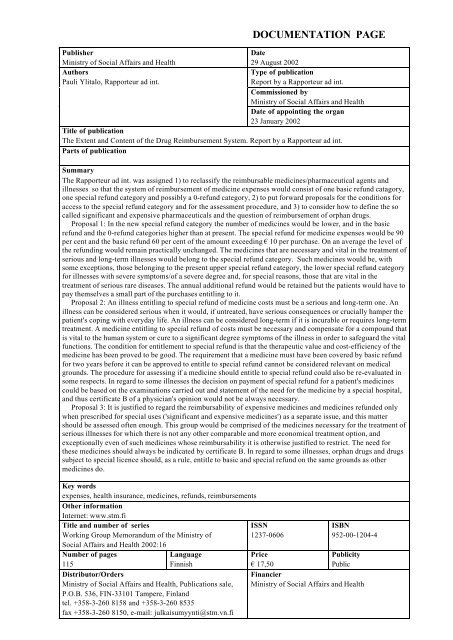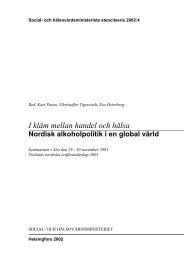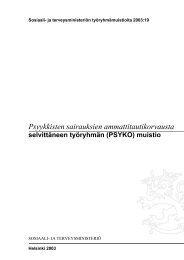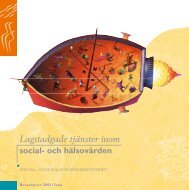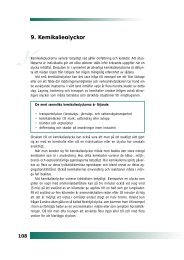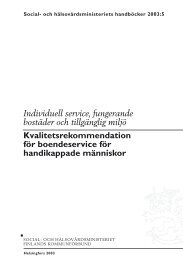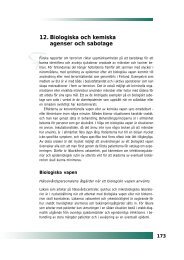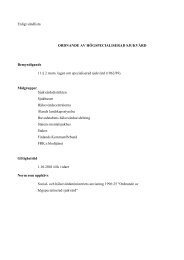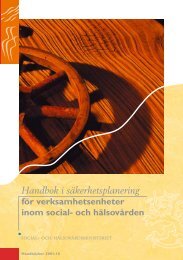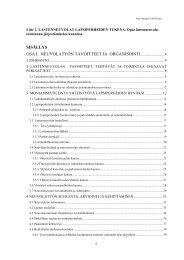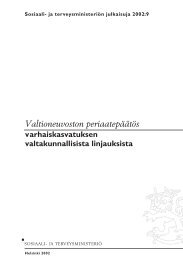Sosiaali- ja terveysministeriön monisteita 2000:
Sosiaali- ja terveysministeriön monisteita 2000:
Sosiaali- ja terveysministeriön monisteita 2000:
Create successful ePaper yourself
Turn your PDF publications into a flip-book with our unique Google optimized e-Paper software.
DOCUMENTATION PAGE<br />
Publisher<br />
Date<br />
Ministry of Social Affairs and Health<br />
29 August 2002<br />
Authors<br />
Type of publication<br />
Pauli Ylitalo, Rapporteur ad int.<br />
Report by a Rapporteur ad int.<br />
Commissioned by<br />
Ministry of Social Affairs and Health<br />
Date of appointing the organ<br />
23 January 2002<br />
Title of publication<br />
The Extent and Content of the Drug Reimbursement System. Report by a Rapporteur ad int.<br />
Parts of publication<br />
Summary<br />
The Rapporteur ad int. was assigned 1) to reclassify the reimbursable medicines/pharmaceutical agents and<br />
illnesses so that the system of reimbursement of medicine expenses would consist of one basic refund catagory,<br />
one special refund category and possibly a 0-refund category, 2) to put forward proposals for the conditions for<br />
access to the special refund category and for the assessment procedure, and 3) to consider how to define the so<br />
called significant and expensive pharmaceuticals and the question of reimbursement of orphan drugs.<br />
Proposal 1: In the new special refund category the number of medicines would be lower, and in the basic<br />
refund and the 0-refund categories higher than at present. The special refund for medicine expenses would be 90<br />
per cent and the basic refund 60 per cent of the amount exceeding € 10 per purchase. On an average the level of<br />
the refunding would remain practically unchanged. The medicines that are necessary and vital in the treatment of<br />
serious and long-term illnesses would belong to the special refund category. Such medicines would be, with<br />
some exceptions, those belonging to the present upper special refund category, the lower special refund category<br />
for illnesses with severe symptoms/of a severe degree and, for special reasons, those that are vital in the<br />
treatment of serious rare diseases. The annual additional refund would be retained but the patients would have to<br />
pay themselves a small part of the purchases entitling to it.<br />
Proposal 2: An illness entitling to special refund of medicine costs must be a serious and long-term one. An<br />
illness can be considered serious when it would, if untreated, have serious consequences or crucially hamper the<br />
patient's coping with everyday life. An illness can be considered long-term if it is incurable or requires long-term<br />
treatment. A medicine entitling to special refund of costs must be necessary and compensate for a compound that<br />
is vital to the human system or cure to a significant degree symptoms of the illness in order to safeguard the vital<br />
functions. The condition for entitlement to special refund is that the therapeutic value and cost-efficiency of the<br />
medicine has been proved to be good. The requirement that a medicine must have been covered by basic refund<br />
for two years before it can be approved to entitle to special refund cannot be considered relevant on medical<br />
grounds. The procedure for assessing if a medicine should entitle to special refund could also be re-evaluated in<br />
some respects. In regard to some illnesses the decision on payment of special refund for a patient's medicines<br />
could be based on the examinations carried out and statement of the need for the medicine by a special hospital,<br />
and thus certificate B of a physician's opinion would not be always necessary.<br />
Proposal 3: It is justified to regard the reimbursability of expensive medicines and medicines refunded only<br />
when prescribed for special uses ('significant and expensive medicines') as a separate issue, and this matter<br />
should be assessed often enough. This group would be comprised of the medicines necessary for the treatment of<br />
serious illnesses for which there is not any other comparable and more economical treatment option, and<br />
exceptionally even of such medicines whose reimbursability it is otherwise justified to restrict. The need for<br />
these medicines should always be indicated by certificate B. In regard to some illnesses, orphan drugs and drugs<br />
subject to special licence should, as a rule, entitle to basic and special refund on the same grounds as other<br />
medicines do.<br />
Key words<br />
expenses, health insurance, medicines, refunds, reimbursements<br />
Other information<br />
Internet: www.stm.fi<br />
Title and number of series<br />
Working Group Memorandum of the Ministry of<br />
Social Affairs and Health 2002:16<br />
Number of pages<br />
Language<br />
115<br />
Finnish<br />
Distributor/Orders<br />
Ministry of Social Affairs and Health, Publications sale,<br />
P.O.B. 536, FIN-33101 Tampere, Finland<br />
tel. +358-3-260 8158 and +358-3-260 8535<br />
fax +358-3-260 8150, e-mail: julkaisumyynti@stm.vn.fi<br />
ISSN<br />
1237-0606<br />
ISBN<br />
952-00-1204-4<br />
Price<br />
Publicity<br />
€ 17,50<br />
Public<br />
Financier<br />
Ministry of Social Affairs and Health


